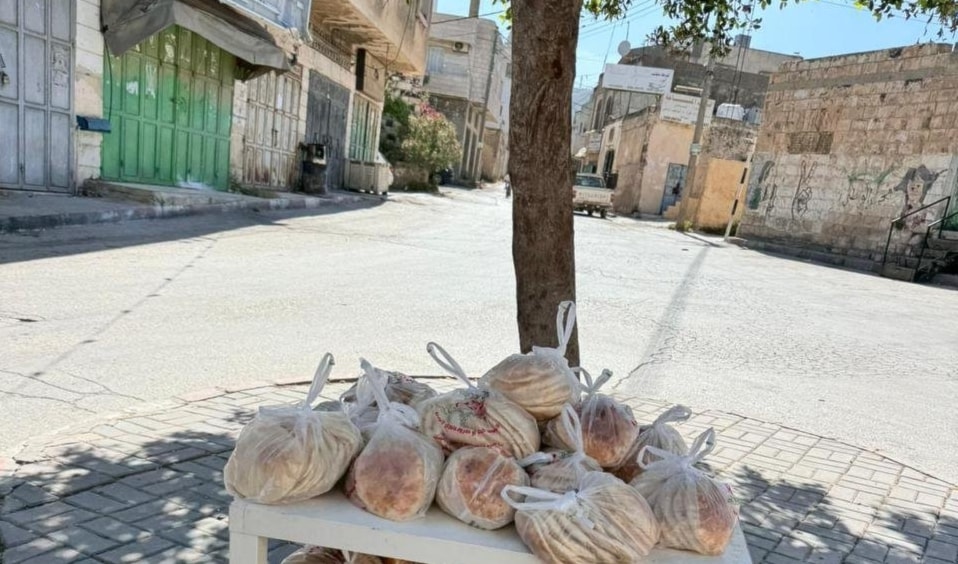'Israel' fears West Bank escalation as Fatah urges general strike
Israeli media reports fears of heightened tensions in the West Bank after the occupation's Nur Shams military campaign, with Fatah announcing a comprehensive strike across all cities.
-

Bread left under a tree in Beit Furik, West Bank, as the general strike condemning the Israeli occupation's militarily campaign in Nur Shams begins on April 21, 2024. (Social media)
Israeli media reported on Sunday about fears of escalating tensions in the West Bank following the Nur Shams operation, with the Fatah movement announcing an escalation with "Israel".
According to i24news, Fatah announced a comprehensive strike across all cities in the West Bank today. The Palestinian Teachers Union in the Palestinian Authority also joined the strike.
This comes after Israeli occupation forces partially withdrew from Nur Shams camp on Sunday evening after a three-day aggression. The operation impacted infrastructure, including electricity, water, communication, and internet networks.
It also resulted in the destruction of Palestinians' property and the killing of young men, who were surrounded, captured, and killed in the outdoors. Ambulances were reportedly prevented from transporting the injured to the hospital.
The Israeli occupation claimed that the operation in Nur Shams resulted in seven injuries to Israeli forces, including two moderate injuries.
'Israel' economically choking West Bank in subjugation attempt
"Without these funds [import duties and value-added tax], the Palestinian Authority struggles to pay the salaries of its civil servants and its running costs," said Taher al-Labadi, a researcher at the French Institute for the Near East, as he explained that "Israel" has been holding the Palestinian people in an economic chokehold.
Palestinian economist Adel Samara told AFP that the genocidal war against the Gaza Strip following Operation Al-Aqsa Flood has not only devastated the Gaza Strip but also resulted in "Israel" tightening the noose against the Palestinian Authority, which rules parts of the West Bank.
This was possible because the Palestinian economy operates under the 1994 Paris Protocol, which was meant to last for five years until the establishment of the Palestinian State. It is through this protocol that "Israel" holds control over the territories' borders, allowing it to collect import duties and value-added tax for the Palestinian Authority. "Israel" has frequently used this authority to withhold vital revenue from the PA. However, since "Israel's" deterrence was scathed, Tel Aviv's control intensified, tightening its hold even further said Samara.
Samara said that "technically speaking, there is no Palestinian economy under Israeli occupation -- our economy has been effectively annexed by Israel's," referring to the sectors of tourism, labour, and trade altogether.
Collective punishment
In turn, Israeli occupation political analyst Michael Milshtein told AFP that Israeli occupation statistics show that approximately one-third of the income in the West Bank was derived from the earnings of 193,000 Palestinians employed in "Israel". However, the current number of Palestinians working in "Israel" has significantly decreased to between 8,000 and 9,000.
Milshtein stressed, "It's a way to collectively punish Palestinians...whom they also see as enemies."
However, Nasr Abdel Kareem, an economics professor at the Arab American University in the West Bank, had made a different but similar argument. Abdel Kareem explained that Israeli PM Netanyahu has been playing a game of chess.
"Netanyahu is putting pressure on the Palestinians and signalling to the authority that the levers of the Palestinian economy are in (Israel's) hands," Abdel Kareem said before adding that "Netanyahu believes that he will weaken the authority and make it accept political concessions" when, according to him, a peace agreement would be eventually written.
Abdel Kareem, however, underscored that this is an unrealistic and flawed strategy as it assumes that fostering economic growth in the Palestinian territories would inherently lead to peace in the West Bank.
"Historically, previous uprisings broke out" when the West Bank and occupied Palestinian territories were in a much better economic state.
"Palestinians want to live with dignity, but for them, this also implies liberation and the establishment of a Palestinian state," said the economist.
Read more: Pro-Palestine protests flood Europe, US

 4 Min Read
4 Min Read








